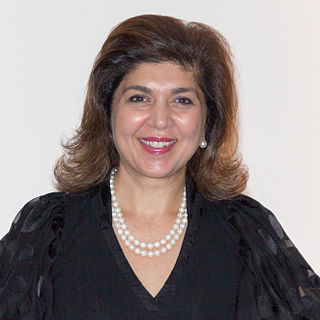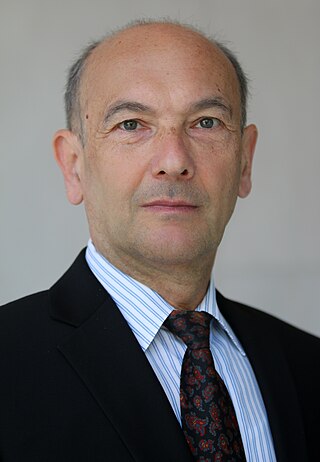
A think tank, or policy institute, is a research institute that performs research and advocacy concerning topics such as social policy, political strategy, economics, military, technology, and culture. Most think tanks are non-governmental organizations, but some are semi-autonomous agencies within government or are associated with particular political parties, businesses or the military. Think-tank funding often includes a combination of donations from very wealthy people and those not so wealthy, with many also accepting government grants.

A great power is a sovereign state that is recognized as having the ability and expertise to exert its influence on a global scale. Great powers characteristically possess military and economic strength, as well as diplomatic and soft power influence, which may cause middle or small powers to consider the great powers' opinions before taking actions of their own. International relations theorists have posited that great power status can be characterized into power capabilities, spatial aspects, and status dimensions.
Robert L. Gallucci is an American academic and diplomat, who formerly worked as president of the John D. and Catherine T. MacArthur Foundation. He previously served as dean of the Edmund A. Walsh School of Foreign Service at Georgetown University, from 1996 to June 2009. Prior to his appointment in 1996, for over two decades he had served in various governmental and international agencies, including the Department of State and the United Nations.

The School of International Service (SIS) is American University's school of advanced international study, covering areas such as international politics, international communication, international development, international economics, peace and conflict resolution, international law and human rights, global environmental politics, and U.S. foreign policy.

The Elliott School of International Affairs is the professional school of international relations, foreign policy, and international development of the George Washington University, in Washington, D.C. It is highly ranked in international affairs and is the largest school of international relations in the United States.

The Center for a New American Security (CNAS) is a Washington, D.C. based think tank established in 2007 by co-founders Michèle Flournoy, board member of military contractor Booz Allen Hamilton, and Kurt M. Campbell, coordinator for Indo-Pacific Affairs in the Biden Administration. Funded by Northrop Grumman, dozens of military contractors, Chevron, Amazon, Google and other large corporations, CNAS specializes in United States national security issues, such as terrorism, irregular warfare, the future of the U.S. military, the emergence of Asia as a global power center, war games pitting the US against the People's Republic of China and the national security implications of natural resource consumption.
Nilofar Sakhi is an author and a policy analyst with expertise in security, geopolitics & peace. She is a professorial lecturer of International Affairs at George Washington University and a non resident senior fellow at the Atlantic Council.

Yan Xuetong is a Chinese political scientist and serves as a distinguished professor and dean of the Institute of International Relations at Tsinghua University. Yan is one of the major Chinese figures in the study of international relations (IR). He is the founder of 'moral realism', a neoclassical realist theoretical paradigm in IR theory.
Bates Gill is an expert on Chinese foreign policy and a former Director of the Stockholm International Peace Research Institute (SIPRI).

Andrew Carrigan Kuchins is an American political scientist, academic, and former head of American University of Central Asia. He has held senior positions at several think tanks, including Carnegie Endowment for International Peace, Center for Strategic and International Studies and Carnegie Moscow Center. Kuchins has written numerous books, articles, book reviews. He has been interviewed on mainstream and academic outlets including as CNN, Politico, The New York Times, The Washington Post, Washington Times, The Moscow Times, Chicago Tribune and CS Monitor. Additionally, Kuchins has given testimony before the United States Congress on Russia, Central Asia and the Caucasus.

Farah Pandith is an American academic of Indian descent. She was appointed the first-ever Special Representative to Muslim Communities in June 2009 by Secretary of State Hillary Rodham Clinton. The position was made specifically for her after she briefed Secretary Clinton about her work in the Bush Administration. She had the rare distinction of being a political appointee for two Republican presidents and President Obama. When she was the Special Representative she traveled to almost 100 countries. After serving under both Secretaries Clinton and John Kerry, she left government. She said she came to Washington after 9/11 again and wanted to serve – she left after more than a decade in public service. She worked at USAID and then went to the National Security Council and then the U.S. Department of State. When she left in 2014, she returned to her home state of Massachusetts.
Salma Malik is a teacher at the Department of Defence and Strategic Studies, Quaid-e-Azam University in Islamabad, Pakistan.
Hekmat Khalil Karzai is the deputy foreign minister of Afghanistan. He was appointed as the deputy foreign minister on 21 January 2015.

Michael E. Brown is an American academic. He formerly served as Dean of the Elliott School of International Affairs of the George Washington University, where he currently serves as Professor of International Affairs, Political Science, and Gender Studies.

David Shambaugh is the Gaston Sigur Professor of Asian Studies, Political Science & International Affairs, and director of the China Policy Program at the Elliott School of International Affairs, George Washington University, Washington DC. He is also a non-resident senior fellow at the Brookings Institution.

Henry R. Nau is professor of political science and international affairs at Elliott School of International Affairs at George Washington University. He is the author of a theory of American foreign policy known as conservative internationalism and a book by the same name.
Charles Louis Glaser is a scholar of international relations theory, known for his work on defensive realism, as well as nuclear strategy. He is the founding director of the Institute for Security and Conflict Studies at the George Washington University's Elliott School of International Affairs, as well as a professor of political science and international affairs. His best-known book, Rational Theory of International Politics: The Logic of Competition and Cooperation received an Honorable Mention for 2011 Best Book from the International Security Studies Section of the International Studies Association.

Igor Alexandrovich Zevelev is a Russian political scientist who has been a Global Fellow at the Wilson Center since 2020.

Shahrbanou Tadjbakhsh is an Iranian-American researcher, university lecturer, and United Nations consultant in peacebuilding, conflict resolution, counter-terrorism, and radicalization, best known for her work in "Human Security" and for contributions in the republics of Central Asia and Afghanistan, as cited by the New York Times and other publications as well as hundreds of scholarly publications. Currently, she is a lecturer at Sciences Po, researcher, and consultant to the United Nations.
Alyssa Ayres is the Dean of The George Washington University's Elliott School of International Affairs, the first woman to hold the post. She was also a Senior Fellow at the Council on Foreign Relations for India, Pakistan, and Southeast Asia from October 2013 to February 2021. After her appointment as dean of the Elliott School of International Affairs, she has taken a position as an adjunct senior fellow at the Council on Foreign Relations. Her book Our Time Has Come: How India is Making Its Place in the World, was published in January 2018 and appeared on the “Summer 2018: Politics” list in the Financial Times.












